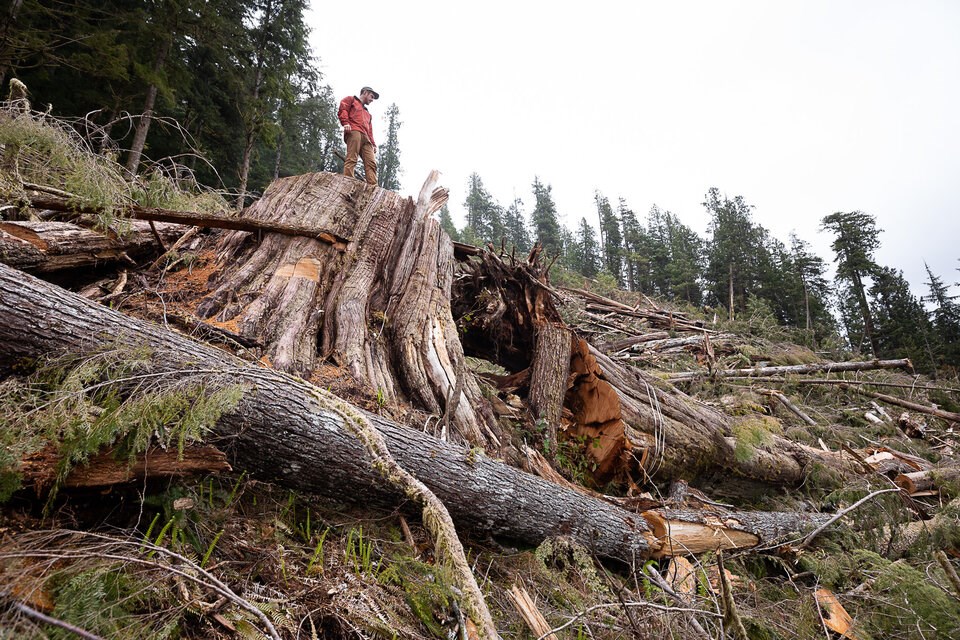A B.C. MP representing the longest named riding in Canada has introduced a motion to ban the export of old-growth logs and any products made from them.
Patrick Weiler, Liberal MP for West Vancouver—Sunshine Coast—Sea to Sky Country, introduced the private members’ motion Thursday. The motion calls for an end to the export of old growth as soon as possible but no later than 2030.
It also calls on the federal government to end old-growth logging on federal lands outside of reserves, including national parks and land held by the Department of National Defence.
“This is really about putting this on the radar to really push the federal government to act on this,” said Weiler in an interview. “There's probably no more important environmental issue in B.C. than protecting old growth.
“This is essentially our cathedrals that are being cut down.”
Joe Nemeth, project manager for the BC Pulp and Paper Coalition, slammed the motion, saying if old-growth exports were banned, it would sink industry because companies use export pricing to compensate for domestic costs of timber harvesting.
“It would be a big deal. If they include both wood and pulp made from old growth, then I think you bring the entire province to a standstill,” said Nemeth. “So you basically kill the industry and kill the province because the forest industry is still the biggest employer and it's all in small, rural communities.
“It would be the most catastrophic thing you could ever do.”
The Forest Products Association of Canada and BC Council of Forest Industries declined to comment on the motion.
Several environmental groups, however, lauded Weiler. Ken Wu, executive director of the conservation group Endangered Ecosystems Alliance, said he hopes the motion will push B.C. to take action on Crown lands, where most of Canada’s forests grow.
“The Biden administration in the U.S. is now creating a pathway that could end old-growth logging on their public lands across the country, and B.C. and Canada need to do the same,” he said in a statement.
TJ Watts, a campaigner and photographer with the Vancouver Island-based Ancient Forest Alliance, said the motion’s policy recommendations would represent “a major leap forward.”
Weiler, who was first elected in 2019, sits on a federal Environment and Sustainable Development Committee. In March, the committee voted to increase a previously announced Old-Growth Nature Fund to $82 million from $50 million. The motion Weiler submitted this week calls on the federal government to speed up the rollout of that fund before the end of 2023.
Weiler says the federal government is still negotiating with the B.C. government to match the fund and boost it to $164 million.
“There's less than eight per cent of big-treed old growth left in B.C... we really need to protect this as quickly as possible,” he said.
How old is old growth?
Weiler acknowledged defining what counts as old-growth trees would be a challenging but not an insurmountable obstacle. Part of the challenge comes from Canada's vast size — each province has its own definition, often a reflection of the variety of forest ecosystems that span the country.
In B.C. — where old-growth forests have acted as flash-points for the largest acts of civil disobedience in Canadian history — the province has two definitions: coastal old growth must be at least 250 years old to qualify, while in many Interior forests, the minimum age is 140 years. But foresters disagree on those age thresholds, with their definitions climbing two to three times higher, says Nemeth.
On the other side of the country, Nova Scotian old-growth stands must be at least 125 years old. Go to Ontario, and you'll find 59 sub-definitions of old growth. And in Saskatchewan, the definition of old trees varies from minimum age of 91 years for hardwood and 101 years for softwood, according to one 2020 analysis.
So long as it's scientifically defensible, Weiler said defining old growth should be left to Environment and Climate Change Canada and Natural Resources Canada.
Banning the export of old growth could be trickier, Weiler said, and would need go through consultation with the provincial governments and Indigenous peoples.
“We need to make sure it's World Trade Organization-compliant,” he said. “And so my hope would be that it would take much less time than 2030 to put that into place, but absolutely no later than 2030.”
Weiler says that while his motion targets old-growth logging, he said all levels of government need to do more to support a sustainable logging industry that would get more value out of the country’s forests.
Weiler said he has received support for the motion from a number of other MPs. As of Friday afternoon, Liberal MP John Aldag of Cloverdale-Langley City was the only one who had officially seconded the motion.
Private members’ motions are considered through a lottery system Weiler says has put him behind several of his fellow parliamentarians. If adopted, such motions do not bind governments to a specific policy direction or course of action.





